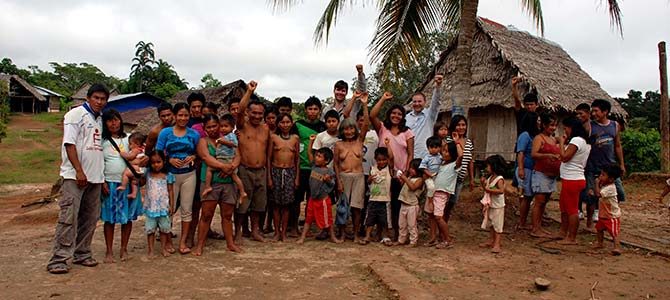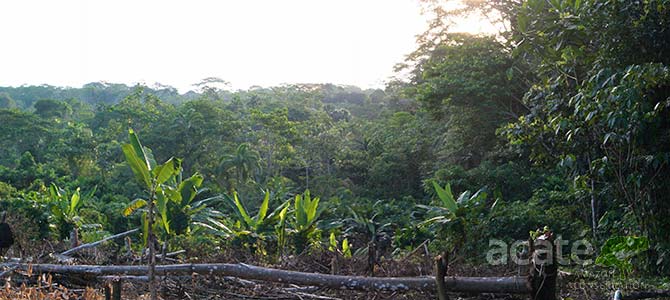 Matsés Village in Peruvian Amazon © Acaté
Matsés Village in Peruvian Amazon © Acaté Reclaiming Sustainable Agriculture: Strengthening Communities and Providing Infrastructure
Acaté is working with traditional Matsés tribes to build truly sustainable and resilient living systems that provide food staples for their communities. This is work is designed to help alleviate dependency and provide empowerment for the Matsés and reduce the need to sacrifice their cultural manners and practices due to nutritional and structural dependency.

Typical clearcutting. Massive erosion will follow the onset of the rainy season. © Acaté
A paradox to the exhuberance of life they support, the soils of the rainforest are intrinsically poor. The balance of rainforest life depends on a constant cycle of breakdown and renewal. The topsoil comprises the thinnest layer of organic material over clay which becomes rapidly eroded and washed out after a forest is clear-cutted. After a few seasons, the land becomes unusable, capable of supporting only the most tenacious weeds and grasses.
Following the path of most Amerindian forest tribes since contact, the Matsés have reorganized their traditional settlement patterns into larger, nucleated villages along the rivers to facilitate centralized access to trade goods and healthcare. As a result, the communities are obliged to cut additional forest, increasingly edging their fields farther away from the village. To efficiently access their fields and hunts, they require gasoline for outboard motors, which is a highly expensive and scarce local commodity. This necessity then places extra pressure on the constrained economic base of the villages and enhanced dependence on external resources. Moreover, the journey to access the terrains requires immense amount of time and takes away from other activities centered around the forest.
Acaté is planning projects with the communities to apply concepts of permaculture, the goal being to adapt their farming practices around their fixed settlements to more sustainable methods and increase the biodiversity in their immediate surroundings. Some examples of sustainable permaculture include terracing, shifting cultivation, the use of native nitrogen-fixing flora to enrich the soil, as well as the development of fish farms to provide protein and nitrogenous wastes that can be used as natural fertilizers. These models can be applied on a larger scale to other eroded Amazonian soils in other impacted communities; small-scale agriculture is a major driver of deforestation in the Amazon.
Recent archaeological evidence shows that centuries ago Amazonian societies were able to support large populations than once thought possible in the rainforest. The agricultural knowledge and techniques that kept their farms productive was lost in the devastation that followed European conquest and disease. Indeed, the semi-nomadic nature of the Matsés and that of other tribes before ‘contact’ in the 20th century is, in many ways, an adaptation to that fragmentation. This lost knowledge of sustainable agriculture is what Acaté and the Matés are trying to reclaim. These systems have the potential to provide the Matsés with food security and mitigate the other challenges caused by the unsustainable agriculture. Combined with our eco-social entrepreneurship work these programs, we can help preserve 2.3 million acres of forest and provide a readily adaptable model for others groups and regions in the tropics.
